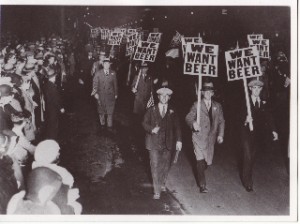A few days ago, I stumbled across a tiny digest piece in the local paper’s business section. The headline read “Big 4 Brew Half World’s Beer” and it talked about how the four biggest mega-breweries last year surpassed an important threshold and now control more than half of the world’s beer consumption. Obviously the paper thought this insignificant news, giving it only 100 words or so. But I have reflected on this statistic for a few days, and find myself deeply troubled – more than usual – about the state of the beer industry. It has been decades since the corporate breweries solidified their hold on beer drinkers, so in that respect this piece is nothing new.
However, I think this development needs to be seen in a larger context. For the last decade, beer sales have been relatively flat. There have been only two growth areas. First, developing nations like China and Brazil, where growing elite classes have more money to spend on beer, have become the new hip market for multi-nationals. Second, in North America (and Europe) imports and micro-brewed beers are the only areas of growth, with microbrews having a particularly steep curve.
Those facts seem to contradict the reality of the growing domination of a handful of brewers.
This is what I think is going on. There are three things to pay attention to. First, the latest round of mergers and acquisitions has been targetted at big boys buying big boys, creating REALLY BIG boys (see Anheuser-Busch v. Inbev). This is exclusively about corporate power and control – taking over rivals to gain nano-advantages in the beer wars. This has NOTHING to do with the consumer and our desires. It is standard Wall Street/Bay Street corporate maneouvring. And what is worse is that each brewery already owns dozens of popular brands from around the world, sucking in more sales into their empire.
Second, the macro brewers know that their growth markets are in the developing world. They have been spending gads of cash on marketing Budweiser, Stella Artois, Guinness and other global brands to the citizens of Asia, South America and Africa. I personally can see this as nothing but corporate colonization. The reason is that all these places have local, small scale brewers trying to make beer to appeal to their residents. And the grand marketing schemes of the big boys pushes them out, creating a less diverse beer landscape in those nations – just like what happened to us 50 years ago.
Third, the corporations know that consumers in North America and Europe are becoming more knowledgeable (definitely a good thing). So they are also busy buying up profitable craft berwers and launching their own faux craft brands (Rickards Red or Alexander Keith’s White, anyone?) to try to fool that market.
The end result? They scoop up more of the global beer market without anyone knowing about it. And before we know it, they control the market. Hence the quiet news report that four companies – AB-Inbev, SABMiller, Heineken and Carlsberg – control the majority of the market. Add the next largest breweries – which includes Modelo, Tsingtao, and Yanjing – and you quickly get to 75% of the global market.
Keep in mind, before you Canadians get cocky, that two corporations control 90% of our market – the lower dominance is in developing nations. The trend toward corporate conglomeration is not yet complete, I am afraid.
Too many of us order a Stella or a Guinness and consider ourselves above the ordinary. And in a way that is true. Both are good beers – better than the bulk of corporate brews. However, we have not yet become escaped being part of the problem.
To be a part of the solution, we need to figure out what beers are brewed locally and what import beers are truly independent (Fullers from England is a good example), and make a decision to purchase beers like that only. Consumer choice of that nature won’t change the world overnight, but it might create enough cash flow for the little guy so that they might survive another year. So read my Prairie Beer page and purchase your beers from those deserving brewers. It is the best way to avoid being a dupe of globalization.
Plus the beer is better!



July 18, 2011 at 12:01 AM
It struck me the other day that Edmonton’s Live Local organization (livelocal.ca) could probably help boost the microbreweries’ profile among people who are keen to buy local farm produce, eat at independent restaurants, and support Edmonton artists. So I went about trying to find an easy-to-read info on the Canadian beer industry players and who owns what so that I could show my friends and networks just how consolidated and dominant the Big 2 are here in Alberta. (I was specifically hoping to find an infographic like this: https://www.msu.edu/~howardp/seedindustry.html cause it tells the story pretty effectively.) I consider myself a proficient online researcher but it was very difficult to find publicly-accessible, recent, detailed, Canadian info! Your article punched out exactly what I was wanting to know, so first, thank you many times over, and second, please do more beer industry politics articles! Do you know where one may find the beer company “family trees,” i.e. who owns what brands?